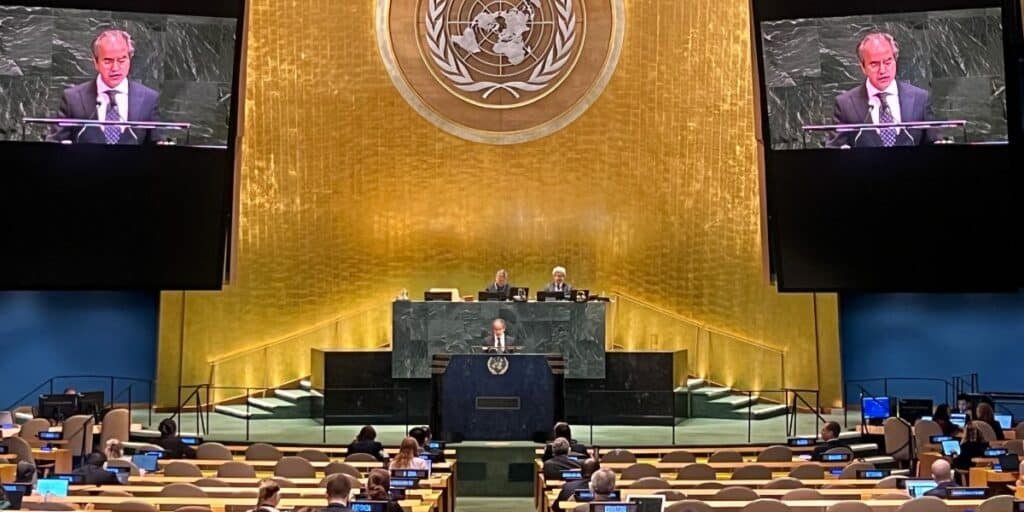WEBDESK: Pakistan has issued a strong warning to the United Nations (UN) about the growing threat of cross-border terrorism emanating from Afghanistan, citing credible evidence of increased collaboration among banned militant groups targeting its critical infrastructure and development projects.
Speaking at the UN General Assembly on Monday, Pakistan’s Permanent Representative Ambassador Asim Iftikhar Ahmad revealed that terrorist outfits such as Tehreek-i-Taliban Pakistan (TTP), Balochistan Liberation Army (BLA), and the Majeed Brigade were operating from ungoverned territories inside Afghanistan.
“These Afghan-based terrorist networks are growing in coordination and capabilities, threatening Pakistan’s security and regional stability,” Ambassador Ahmad said.
He makes these comments as the terror attacks in Pakistan are on the rise in the past few weeks.
On June 28; a suicide bomber detonated his explosives laden vehicle on a military convoy at North Waziristan killing 16 soldiers and wounding several civilians.
A few days ago, a group of five senior government officials, including an Assistant Commissioner was killed in Bajaur as their vehicle was smashed by a roadside bomb.
Ambassador Ahmad blamed the increased lethality of these attacks on the sophisticated weaponry left behind by international forces following their 2021 withdrawal from Afghanistan.
“These weapons are now being used by terrorists to launch increasingly advanced attacks against Pakistan,” he stated.
In my statement in GA today, I highlighted the need for structured engagement with Afghanistan, averting humanitarian crisis & ensuring that Kabul does not become a hub of terrorism. I also drew the world's attention to threats posed by the TTP to Pakistan & the wider region. https://t.co/PFpVUcdcPM
— Asim Iftikhar Ahmad, PR of Pakistan to the UN (@PakistanPR_UN) July 7, 2025
Pointing out the existence of several UN-designated terrorist organizations in Afghanistan, he cautioned that the TTP, an estimated force of 6,000 fighters, is by far the most active and dangerous. Another of his risk indicators was IS-Khorasan, Al-Qaeda, and various Baloch separatists that might cause the destabilization of the region as well.
“We must ensure that Afghanistan does not become a breeding ground for terrorists that threaten its neighbours and the international community,” he urged, calling for immediate action by the UN and regional stakeholders to neutralize these threats.
Statement by Ambassador Asim Iftikhar Ahmad
— Permanent Mission of Pakistan to the UN (@PakistanUN_NY) July 7, 2025
Permanent Representative of Pakistan to the UN
At the General Assembly Plenary Session on the Situation in Afghanistan
(July 7, 2025)
***
Mr. President,
We thank you for organizing this debate. It is an important opportunity to… pic.twitter.com/M7vtfIQPM4
Pakistan, Afghanistan engage in bilateral dialogue on trade, security
In a parallel development, Pakistan and Afghanistan held their first-ever additional secretary-level talks on Monday as part of follow-up actions from Foreign Minister Ishaq Dar’s visit to Kabul in April.
The Pakistani delegation, led by Ambassador Syed Ali Asad Gillani, met with the Afghan side headed by Mufti Noor Ahmad Noor, Director General of the First Political Division at Afghanistan’s Ministry of Foreign Affairs.
According to the Pakistani Foreign Office, the talks covered a wide range of issues, including trade, transit cooperation, regional connectivity, and counterterrorism. Both delegations recognized terrorism as a major impediment to peace and development in the region.
Pakistan reiterated its demand for “concrete action” against terror outfits operating from Afghan soil, stating that such groups not only threaten national security but also obstruct regional economic progress.
Economically, the two sides have discussed the mode through which Afghanistan transit trade could be boosted, among them removal of a 10 per cent processing fee, adopting of a system of insurance guarantee, cutting of custom examination procedures and a track and trace system to track the flow of the cargo.
These developments underscore Pakistan’s dual strategy of international advocacy and direct engagement with Afghan authorities to counter the escalating security threat while enhancing regional cooperation.
Read more: Pakistan weather update: Rain hits north, heatwave persists in south, central regions





